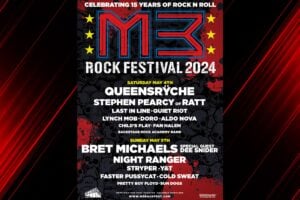
Photo: By Franganghi (Own work) [Public domain], via Wikimedia Commons
Since it’s release in the middle of the last year of the ’90’s, Dream Theater’s Metropolis, Pt. 2 has been put on a pedestal not just by their die-hard fans, but by lovers of multiple genres, reaching as far as classical all the way to art rock. The album cultivates and executes a story that listeners respond to on emotional levels, with some even labeling the album as cathartic or therapeutic. Most distinctive of all, however, is the presence of Dream Theater’s predecessors (and, no doubt, musical heroes).
Metropolis, Pt. 2 is definitely a musical pilgrimage. As listeners, we follow the narrative into the discovery of a young girl named Victoria’s death, with a little mystery, an unscrupulous love affair, and even a little hypnosis along the way. What’s most noteworthy about the band’s fifth album is their seamless marriage of sub-genres as well as their ability to lead their fans on an eerie, captivating journey. Many may be prone to find Dream Theater’s genre category imperceptible because they do exhibit so many talented musical capabilities, which aptly reflect both their predecessors and successors.
However, despite their dabbling in both the discipline and improvising of lengthy, fast-paced instrumental solos (something, that oddly enough, is a signature element of both metal and bebop jazz) as well as the craft and creativity of mastering a rock opera, their sound can be easily categorized as progressive rock. We see this especially within Metropolis, Pt. 2 where Dream Theater’s greatest influences are expressed at every turn and transition of each of the twelve tracks.
An obvious influence is Metallica, noted through the instrumental leanings the band seems to take, as well as their obvious fandom they’re hiding (noted with their release of Official Bootleg: Master of Puppets). Yet their roots don’t just lie in the metal genre, with the band having covered Rush and Pink Floyd as well, showing their appreciation for storytelling, art rock, and their rightfully earned place among other prog rock bands. If anything can be said on the topic of Dream Theater, it’s that they unabashedly wear their influences on their sleeves. And why shouldn’t they? Most of the founding members of the band all met while studying the history, craft, and theory of music at Berklee College of Music, making them self-acclaimed music geeks with the degrees to show for it.
Throughout the album, the presence of some of the greatest pioneers of metal and progressive rock are discovered and explored through the creative license of Dream Theater.
Sitars, shimmering cymbals, and the dinging of bells bring an exotic flavor to the eighth track of the album, “Home”. It isn’t difficult to pick up on the semblance of Metallica’s introduction to “Wherever I May Roam”. Funnily enough, Dream Theater’s title “Home” seems to complete the lyrics to Metallica’s hit (“Anywhere I roam where I lay my head is Home”), but that could just be us reading a little too into things. Regardless, other bands are paid tribute to throughout the album, as well, such as Pink Floyd.
The belting vocals of a soulful singer materialize in the background of “The Spirit Carries On” – an epic ballad, an ode to the truest form of a concept album’s conclusion and a narrative’s resolution – bring about wistful remembrances of Pink Floyd’s “Great Gig in the Sky” in which Clare Torry stuns and captivates with her unearthly wailing. While Dark Side of the Moon ends with an eclipse, Metropolis, Pt. 2 ends with Victoria’s death and all the rumors along with it finally understood, allowing the protagonist, Nicholas, to find peace in his life and let his worries for Victoria go.
And yet there are some remnants of the 1990’s impact on the music industry and musicians of every genre that can be found hidden throughout the album as well. Perhaps not meaning to denote a fandom-hood of Nirvana or Nine Inch Nails, Dream Theater employs musical elements that are definitively found in the grunge and industrial genres. This is particularly noticeable with the sixth track on the album, titled “Beyond This Life”. Grungy guitars and punk rock drums prelude LaBrie’s Trent Reznor-esque vocals in the track, reminding listeners that the influence of the ’90’s promising to survive into the new millennium.
This ’90’s flair seeps into “Through Her Eyes”, as well. The track is key in Nicholas discovering Victoria’s story, as hearing it from her point of view, which he is able to accomplish through some psychedelic means of hypnosis and the shared human consciousness he has with her lingering spirit. Peaceful, angelic humming and a relatively bluesy guitar sounds through as we enter Nicholas’s unconscious, where a female vocalist acts as a feminine presence meant to represent Victoria. The vocals are particularly pop/R&B sounding, potentially reminding listeners of some of the songstresses on the top 40 charts during the late ’90’s.
Metropolis, Pt. 2: Scenes From a Memory is theatrical, expertly orchestrated, and even, some attest to, therapeutic. Through the protagonist’s journey, revealing his past life as Victoria, he acknowledges the pain felt in grieving for the loss of life, yet now knows that one’s spirit never dies. For many fans, this thematic element of the rock opera may have helped them through the loss of a loved one, which is a universal healing power of the cathartic experiences we all have through the making and enjoyment of music.
At the beginning of this year, the band released The Astonishing which is truly a rock opera, with its symphonic, billowing transitions that prove effective due to an angelic chorus and orchestra accompanied by the bands hammering drums and progressive guitar. Yet many fans express a disappointment, often making a point to reference Metropolis, Pt. 2, crowning it the band’s jewel, one they apparently, will never top. Still, there’s a lot to be said about the band’s ability to continuously release concept albums that work, each telling a new and thorough story.
While The Astonishing unveils a 1984-esque tale of future, dystopian societies, Metropolis, Pt. 2 beckons its listeners to follow it through a series of captivating points of view to realize an inevitable truth. Every album, all the way up to the debut of LaBrie-less When Dream and Day Unite, and in between, illustrate the craft of a band that expertly marries sub-genres of rock, giving them an unrivaled leg up on the masterminding of a rock opera that’s indubitably fated to be a precedent and classic symbol future progressive rock albums will aspire to be.



































